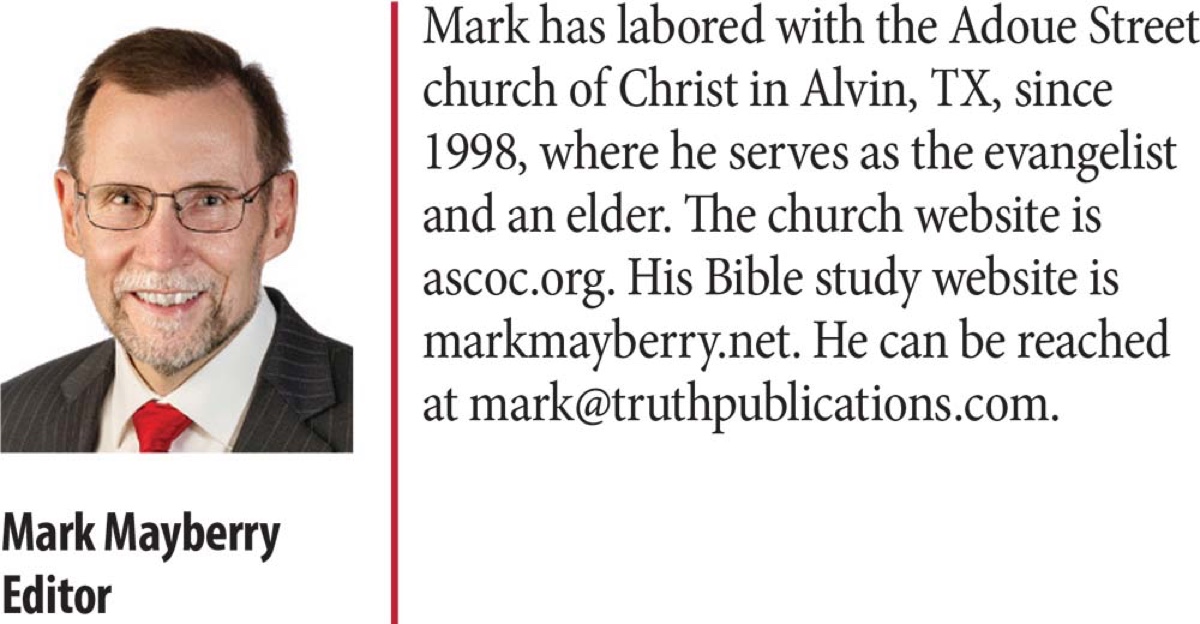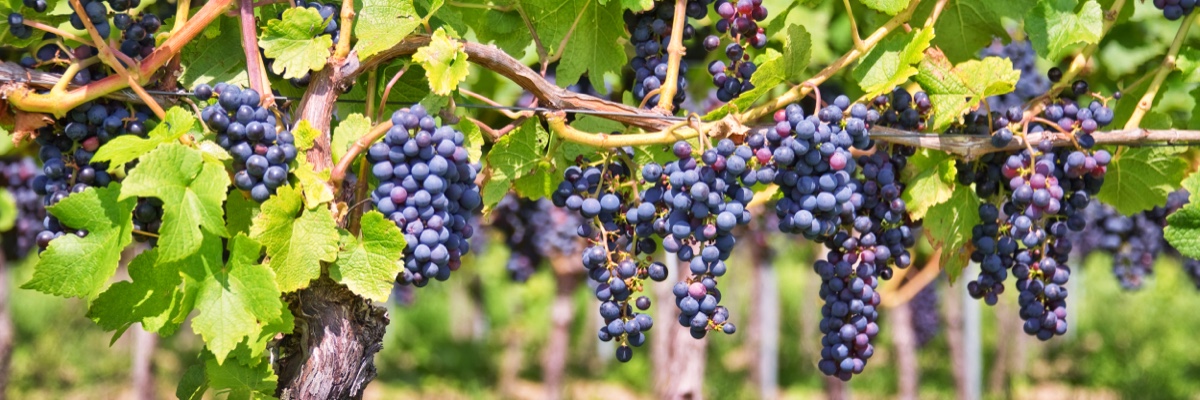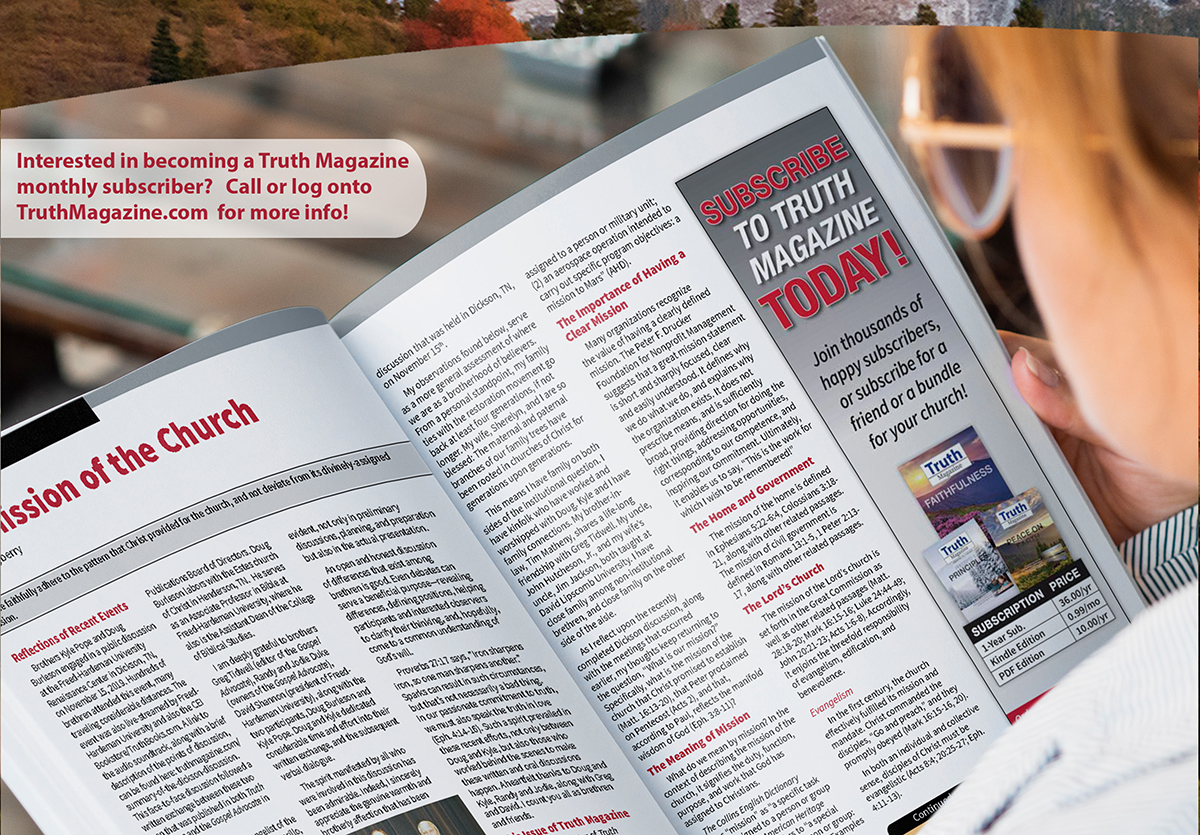by Mark Mayberry
Synopsis: John's gospel records various divine declarations of Jesus: "I am the bread of life, the light of the world, the door of the sheep," etc. Let us consider the significance of His statement, "I am the vine, and you are the branches."
In John 15, Jesus famously said,
I am the true vine, and My Father is the vinedresser. Every branch in Me that does not bear fruit, He takes away; and every branch that bears fruit, He prunes it so that it may bear more fruit. You are already clean because of the word which I have spoken to you. Abide in Me, and I in you. As the branch cannot bear fruit of itself unless it abides in the vine, so neither can you unless you abide in Me. I am the vine, you are the branches; he who abides in Me and I in him, he bears much fruit, for apart from Me you can do nothing. If anyone does not abide in Me, he is thrown away as a branch and dries up; and they gather them, and cast them into the fire and they are burned. If you abide in Me, and My words abide in you, ask whatever you wish, and it will be done for you. My Father is glorified by this, that you bear much fruit, and so prove to be My disciples. Just as the Father has loved Me, I have also loved you; abide in My love. If you keep My commandments, you will abide in My love; just as I have kept My Father’s commandments and abide in His love. These things I have spoken to you so that My joy may be in you, and that your joy may be made full (John 15:1-11).
What lessons can we draw from this text? Jesus is not saying, as some assert, that He is the vine and various denominations are the branches. The language of the text focuses on individual responsibility. Note the personal pronouns: “I” refers to Jesus and “you” identifies the disciples. Note also the statement, “He who abides in Me and I in him.”
It is contextually inaccurate and grammatically illiterate to affirm that Jesus is speaking of separate denominations. Personal pronouns specifically replace the names of people, places or things. They are associated primarily with a particular grammatical person—first person (as I), second person (as you, either singular or plural), or third person (as he, she, it, or if plural, then they).
The Messiah is the Source from which the branches bear fruit: “Then a shoot will spring from the stem of Jesse, and a branch from his roots will bear fruit. . .” (Isa. 11:1-9). A vine gives life to the branches and provides them with access to nourishment. It gives its unique characteristics to its fruit and flowers. In order for branches to bear fruit, the vine must be healthy. The vine must have its roots planted/embedded in soil that is properly tilled, free of encumbrances, with access to water/nourishment. The vine must be cultivated, i.e., regularly pruned, and inspected for blight and insects.
Jesus commanded the disciples, “Abide in Me” (John 15:4-7). The Greek word menō means “to stay, abide, remain” (Thomas, 3306). It is used of “(1) a person or thing [that] remains where he, she, or it is, or (2) a person or thing [that] continues in the same state” (BDAG, 630-631).
Abide in Me, and I in you. As the branch cannot bear fruit of itself unless it abides in the vine, so neither can you unless you abide in Me. I am the vine, you are the branches; he who abides in Me and I in him, he bears much fruit, for apart from Me you can do nothing. If anyone does not abide in Me, he is thrown away as a branch and dries up; and they gather them, and cast them into the fire and they are burned. If you abide in Me, and My words abide in you, ask whatever you wish, and it will be done for you (John 15:4-7).
What does it mean to “abide in” someone or something? Perhaps two biblical illustrations will be helpful.
Before His ascension, the Lord instructed the disciples to remain in the city of Jerusalem until they were endowed with power from on high (Luke 24:49; Acts 1:4-5). What would have happened if one of the apostles had become impatient, saying, “Why are we just sitting around when we could be travelling about preaching? Let’s get started fulfilling the Great Commission!” What would have happened if they had disobeyed the Lord’s command, and departed Jerusalem before the outpouring of the Holy Spirit on Pentecost?
When Paul was transported to Rome to stand trial before Caesar, the ship was caught in a violent storm, and driven before the winds for many days. As it approached the island of Malta, perilous reefs lay ahead. Some of the sailors tried to escape the doomed vessel in the lifeboat, but Paul said, “Unless these men remain in the ship, you yourselves cannot be saved.” Then the soldiers cut away the ropes of the ship’s boat and let it fall away. Although the ship floundered upon a reef, and was broken up by the winds and waves, all were brought to safety because the centurion believed Paul and followed his instructions (Acts 27:27-44). What would have happened if those men had ignored Paul’s inspired warning?
To abide in Christ means that we continually remain in fellowship with our Lord and Savior by submitting to His will. In admonishing the disciples to “Abide in Me,” Jesus said, “apart from Me you can do nothing” (John 15:5). True disciples continue in Christ’s word (John 8:31-32). Those who forge ahead (by pursuing their own path and proclaiming their own precepts) imperil their relationship with both the Father and the Son (2 John 8-9).
Making his defense before King Agrippa, Paul said, “I thought to myself that I had to do many things hostile to the name of Jesus of Nazareth,” yet, in persecuting the church, Saul of Tarsus acted apart from (and in defiance of) Christ’s authority. After encountering Christ on the Damascus road, Saul revised his assessment, repented of his sins, submitted to the Lord’s will in baptism, and began promoting the faith he once sought to destroy (Acts 26:4-18).
Looking back on his former Pharisaical accomplishments, Paul acknowledged their fruitlessness and futility (Phil. 3:2-11). Apart from Jesus Christ, nothing we do endures. Apart from full submission to the will of God, our religion is worthless (Matt. 15:7-9; Col. 2:20–23). With the passing of time, the works of men crumble into dust; however, the word of God endures forever (Isa. 40:6-8; 1 Pet. 1:22-25).
All spiritual blessings reside in Jesus Christ (Eph. 1:3-6), but apart from Christ, nothing we do has meaning or merit; apart from Christ, we cannot honor or glorify God (Eph. 2:4-18).
Jesus said, “My Father is glorified by this, that you bear much fruit, and so prove to be My disciples” (John 15:8). A bountiful harvest is a frequent biblical motif, applicable to individuals and the people of God as a whole. Describing the blessings that are bestowed upon those who fear the Lord and walk in His ways, Psalm 128 says, “Your wife shall be like a fruitful vine within your house, your children like olive plants around your table” (v. 3). Ezekiel 19:10-11 employs similar language collectively of the nation of Israel.
Despite the darkness and danger of the present hour (when Sennacherib, king of Assyria, invaded Judah and besieged Jerusalem), the prophet Isaiah anticipated a bountiful future: “The surviving remnant of the house of Judah will again take root downward and bear fruit upward” (2 Kings 19:29-31; Isa. 37:30-32).
After the inhabitants of Judah and Jerusalem were deported to Babylon, Ezekiel looked beyond the present captivity and portrayed the productiveness associated with Christ’s coming (Ezek. 17:22-24).
Isaiah 5 pronounces divine judgment on ancient Israel, likening them to a wild grapevine that did not bear acceptable fruit. If we fail to bear fruit, it’s not the fault of the Vine. Rather, it is because we did not abide in the vine.
In the Parable of the Sower, Jesus reveals that only the good soil bears fruit with perseverance (Luke 8:25).
But the seed in the good soil, these are the ones who have heard the word in an honest and good heart, and hold it fast, and bear fruit with perseverance (Luke 8:15).
Are we bearing fruit? Are we abiding in the love of God and Christ? Is this reflected in our conduct? Remember that Jesus Himself said, “If you love Me, you will keep My commandments” (John 14:15; cf. also vv. 21-24).
If you love Me, you will keep My commandments (John 14:15).
“He who has My commandments and keeps them is the one who loves Me; and he who loves Me will be loved by My Father, and I will love him and will disclose Myself to him.” Judas (not Iscariot) said to Him, “Lord, what then has happened that You are going to disclose Yourself to us and not to the world?” Jesus answered and said to him, “If anyone loves Me, he will keep My word; and My Father will love him, and We will come to him and make Our abode with him. He who does not love Me does not keep My words; and the word which you hear is not Mine, but the Father’s who sent Me” (John 14:21-24).
Arndt, William, et al. A Greek-English Lexicon of the New Testament and Other Early Christian Literature. Chicago: University of Chicago Press, 2000.
Thomas, Robert L. New American Standard Hebrew-Aramaic and Greek Dictionaries: Updated Edition. Anaheim: Foundation Publications, Inc., 1998.



